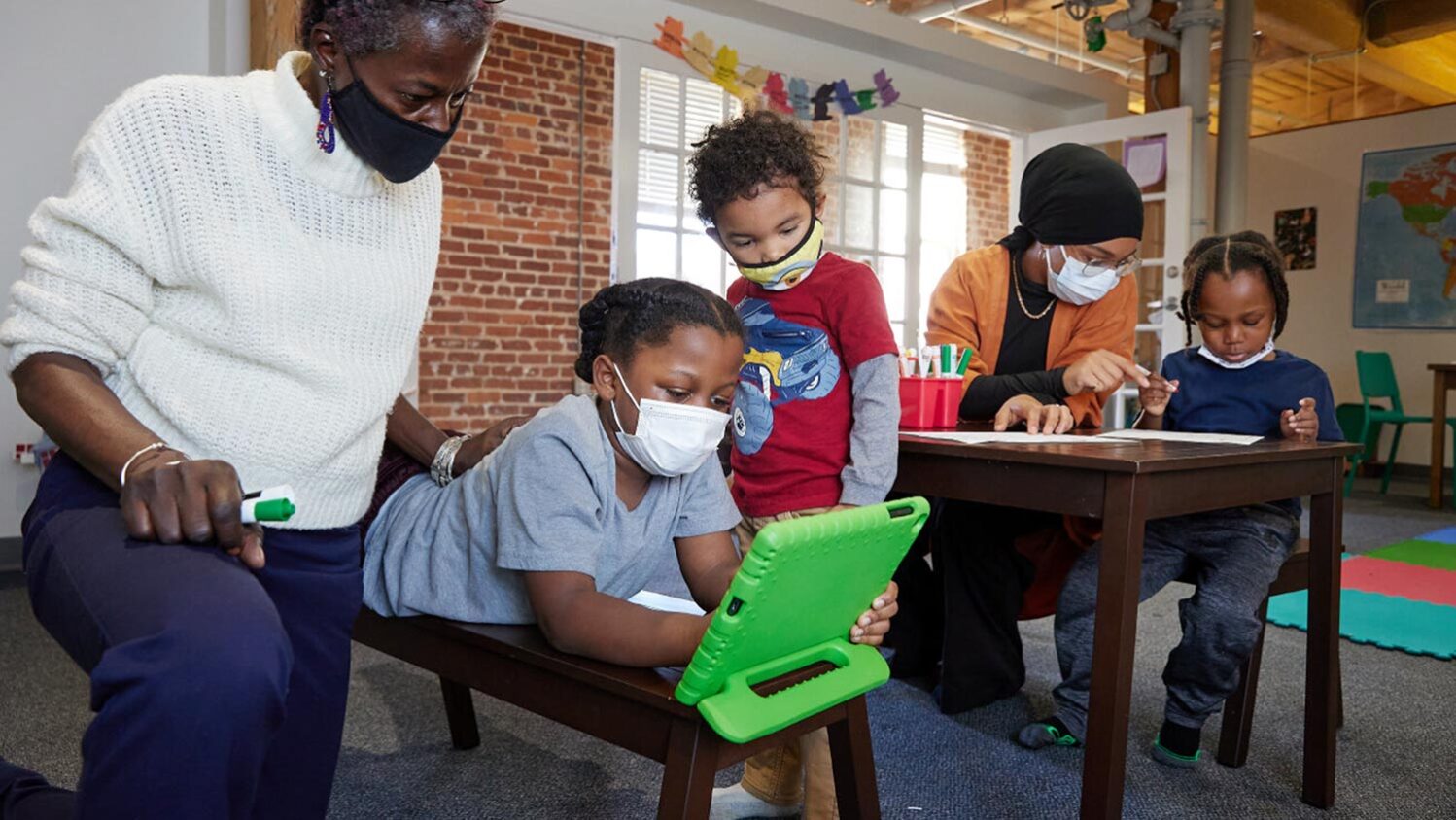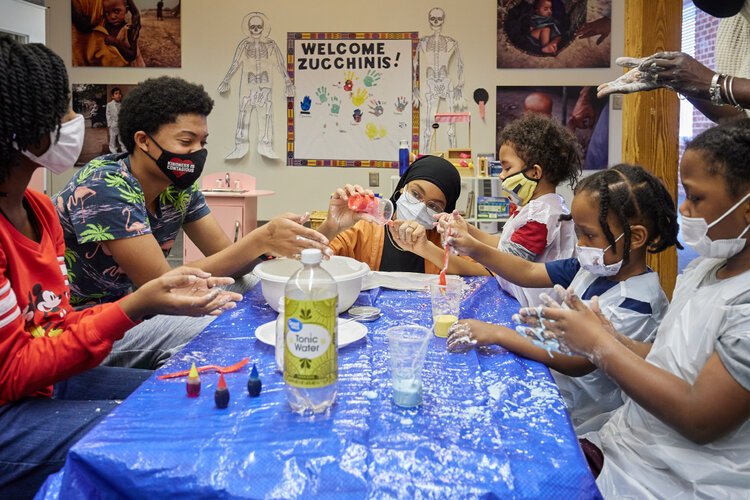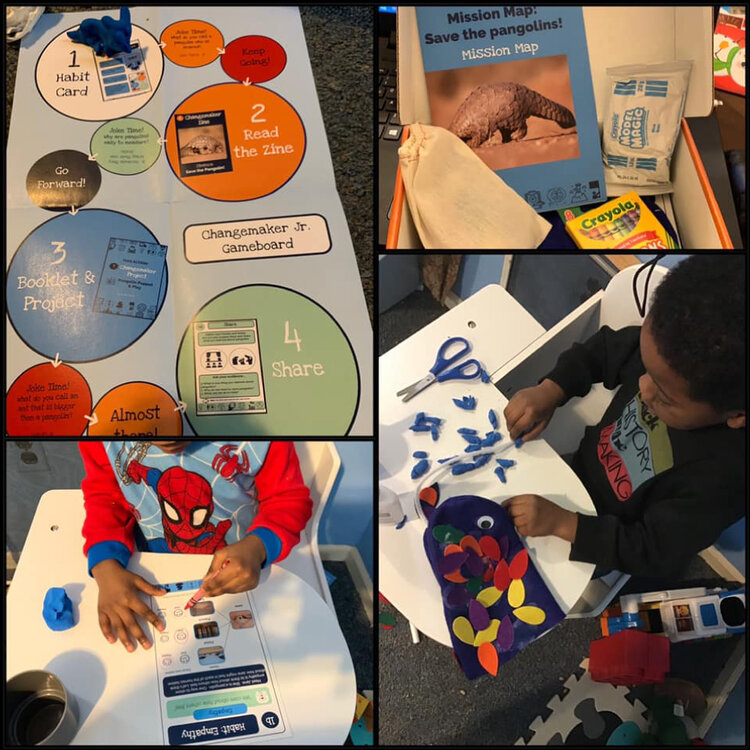What We’re Learning From Out-of-System Learning Models

When schools closed last spring, high school principal Mikala Streeter kept hearing from parents who urgently needed safe school options for their younger children. Along with co-founder Khabral Muhammad, they launched Zucchinis Homeschool Co-op, an Atlanta-based learning pod for elementary-school-aged younger siblings of the high schoolers at her school. “No one could have anticipated this situation,” she says. “But it’s allowed us to create this wonderful community.”

Parents wanted their kids to learn with others, despite the pandemic. Zucchinis Co-op combines the resources of a traditional school with the flexibility of a homeschool program. Each day starts with a morning meeting followed by English and Math; in the afternoon, students dive into hands-on science experiments and passion projects. Zucchinis Co-op focuses on project-based learning with direct application to students’ interests and community. The Zucchinis program allowed parents to focus on their work and ensured their children continued to learn.
No one could have anticipated this situation. But it’s allowed us to create this wonderful community. – Mikala Streeter, co-founder of Zucchinis Co-op
Zucchinis Co-op is just one example of how educators and families are “meeting the moment” during COVID-19 through new ways to build community, support children, and innovate learning. In the fall of 2020, the newly-launched VELA Education Fund created a $2+ Million Meet the Moment grant program to support innovative learning models and urgent solutions, with grants distributed by five partners: the 4.0 Schools, Camelback Ventures, Home School Legal Defense Association (HSLDA), the National Parent Union (NPU), and Youth Entrepreneurs (YE). VELA invested an additional $175,000 directly. Meet the Moment grantees serve learners across 41 states and Puerto Rico, and some operate nationally. The VELA Education Fund was created to support innovators and educators who seek to reimagine and improve access to learning.
Transcend partnered with VELA to facilitate interaction, learning, and growth among Meet the Moment grant program partners and families. Capturing how innovation can – and must – continue despite the pandemic is critical to Transcend, given our mission of supporting communities to create and spread extraordinary, equitable learning environments. While Transcend typically works with district and charter schools, we believe it’s imperative to understand the broadest range of environments that meet the needs of students. To learn from the Meet the Moment communities, we led surveys and focus groups where we heard program leaders’ experiences, desire for change within education, and biggest lessons from this time.

Transcend also launched a community group to facilitate connections and collaboration. This space revealed the needs communities faced and surfaced partnership opportunities. For example, Rock by Rock and Engaged Detroit connected during a Transcend-led community call. Rock by Rock (founded by Sung-Ae Yang and Jeffrey Imrich) creates easy-to-access learning experiences that sit at the intersection of rigorous learning, real-world connection, and 21st-century character development. Their project kits take topics such as “Save the Elephants” or “Artificial Intelligence and Inclusive Design” and create a cohesive learning journey full of offline, hands-on activities that empower kids to experience real-world impact. Engaged Detroit (founded by Bernita Bradley) offers coaching and a network of community partnerships to help Detroit-area parents make homeschooling successful. The two organizations collaborated to offer Rock by Rock’s “7-box Changemaker” to Engaged Detroit’s network of families, giving them accessible, hands-on activities that also develop leadership, character, and literacy skills.

While nearly 30% of VELA’s Meet the Moment grantees developed learning environments in response to the pandemic, the majority used the funding to adapt existing programs to the challenges and needs of the pandemic. One example is Eight Million Stories, a Houston-based nonprofit that seeks to disrupt the school to prison pipeline. Houston annually refers nearly 12,000 young people between the ages of 10 to 18 to the juvenile system. Eight Million Stories supports Black youth to build meaningful relationships in their communities, develop critical job skills, continue their education, and secure meaningful employment.
We’ve pivoted to providing quality social services while continuing to focus on ensuring our youth are positioned for future success. – Marvin Pierre, executive director of Eight Million Stories
Due to job losses in the retail and restaurant industries, youth unemployment has skyrocketed this past year. As Eight Million Stories’ co-founder and executive director Marvin Pierre shares, “Prior to the pandemic we were helping kids with skills for success in education and the workforce but during COVID-19 we needed to think more holistically about wraparound services for basic needs.” These ranged from funds for groceries and rent relief to social and emotional supports due to stress and trauma. “We’ve pivoted to providing quality social services while continuing to focus on ensuring our youth are positioned for future success,” explains Pierre.
Based on our collaboration so far, it’s clear there is growing evidence of demand for new learning models and support systems. Fueling the creation of out-of-system learning environments and investing in their codification and ability to scale will be mission critical to support the learners of the future. Although many learning environments were created or evolved due to the needs of the pandemic, over 80% of program leaders shared that they anticipate continuing post COVID.
Here are some of our major insights and learnings to date:
Families want learning environments grounded in connection and community:
Overwhelmingly, when families get to design or have a say in the design of their child’s educational environment, the experience is richer and the learning deeper. Many grantees are solving for the connection and community the traditional system often lacks. Caregivers know their children best; when they are involved, they can reinforce what children are learning by deepening connections and customizing learning to be more relevant.
Hands-on learning is key:
Students are hungry for supplementary experiences that dive deeply into areas of interest and prefer hands-on learning to additional instruction time via video. The programs we surveyed often offer deeper, more relevant, and more self-driven project-based experiences than those found in traditional school settings. Even after school reopens, innovators leading out-of-system learning urge educators to partner with families and communities on increasing anytime, anywhere learning opportunities. This points to a bigger question around how programs like these relate to in-school learning: How can we get school in the business of doing what it does well, and where can we partner with others on out-of-system learning experiences?
Out-of-school learning may not be sustainable for all:
Though caregivers we surveyed said the ability to play a larger role in their child’s learning during the pandemic was beneficial, they also indicated plans to transition their children back to in-school learning when safe. As workplaces and schools fully reopen, many caregivers will likely have less flexibility and time to engage. This points to another broader question inspired by this research: How much do we expect in-system learning to change if we’re not changing the system around it?
Older students have been overlooked:
As CRPE’s recent analysis noted, the majority of research and content development during the pandemic has focused on Pre-K through 5th grade learners, leaving a tremendous knowledge gap around how to support secondary school students and what they’re experiencing. Our focus group and survey results validate this finding and point to the great need for more emphasis on the whole child along with social and emotional support for older students who are experiencing mental health challenges.
Schools provide a social services net for communities:
When school buildings shuttered, many social service needs went unfilled. Gaps in the system were further exacerbated by the pandemic. Some grantees had to ramp up to offer students holistic services they would have received at school or may need more now than ever due to economic challenges. As things normalize next year, how can we elevate and learn from organizations filling these gaps to ensure students have the connections they need to be cared for?
Meet the Moment programs provide an important window into the current landscape and the ways collaboration, innovation, and an equity focus can empower and uplift youth and adults. By generating creative responses to systemic inequities and the barriers of the global pandemic, these communities offer inspiration and fuel for the work of reimagining education.
Transcend supports communities to create and spread extraordinary, equitable learning environments.

